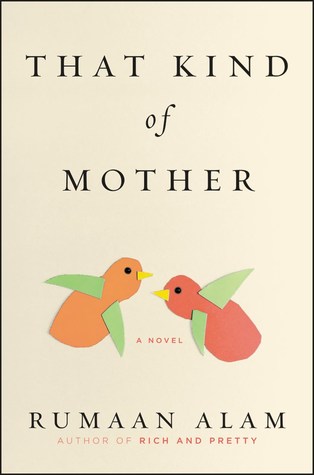That Kind of Mother by Rumaan Alam
/That Kind of Mother
by Rumaan Alam
Ecco, 2018
That Kind of Mother, Rumaan Alam's second novel (following his 2016 debut Rich and Pretty) is the story of Rebecca Stone, an aspiring poet we first meet in the 1980s when she's giving birth to her son Jacob. He's her first baby, and she and her husband Christopher are overwhelmed, and the one voice of friendly sanity in the hospital is Priscilla Johnson, who's full of encouragement and homespun wisdom about the enormous changes Rebecca is going through (“Just because something is natural doesn't make it easy,” Priscilla tells her – a line that foreshadows the entire novel).
Baby Jacob is born – Alam's descriptions of the hospital, the birth, those earliest days will have all new parents vigorously nodding their heads in recognition; it's a quietly bravura opening performance – and in short order Priscilla agrees to become full-time advisor, nanny, and surrogate mother, Rebecca's indispensable friend as she embarks into the strange world of motherhood. Rebecca had once worked in a bookstore in Boston (“that little island of lost souls where certain types with impressive degrees found themselves upon realizing they weren't tough enough for anything but books”), but now she works on her poetry and devotes herself to caring for Jacob, and the intimate presence of Priscilla, who is black, in Rebecca's very white world prompts more than a little facile soul-searching about tacit racism and “otherness.”
The largely plotless book's signature twist moves all such soul-searching right to the front of the stage: Priscilla unexpectedly dies in childbirth, and Rebecca takes in the baby, little Andrew, to raise alongside Jacob. “If you didn't know otherwise, you'd have taken them for a happy family with one black kid,” readers are told much later in the book. “The truth was stranger still.” The slow, very human unfolding of that stranger truth is the gradual, affecting work of That Kind of Mother (“She didn't want to be that kind of mother, the one who can't stop talking about her children, can't stop thinking about them,” we're told. “Surely there had to be another kind of mother for Rebecca to be”).
The narrative follows Rebecca through the years, dramatizing the painful upheavals in her marriage, the stellar progress of her career as a poet (her editor at the New Yorker “smelled of soap and had wrinkles at her eyes”), and, in beguiling, knowing detail, her thousand quotidian discoveries as a mother. Those little moments are brought home in one of the book's most understatedly graceful scenes, when Rebecca has a brief chat about motherhood with the recently-dead Princess Diana (odd in précis, but it works perfectly in context), assuring herself aloud, “My sons, they're real,” and getting a plain, touching response from her ghostly royal visitor: “They're a comfort. My first, you know – he's to be the king of England, but I couldn't believe it when he lost his milk teeth. When he learned to write. When he'd sing me a song.”
It's the hope of sophomore novels to shed as many of the venial sins of debut novels as possible. Rich and Pretty had the usual smattering of such sins – fussiness, telegraphing, etc. – and a stronger than average penchant for heavy-handedness, that feeling that the author is right there at your elbow, watching carefully to make sure the beats land exactly as planned. Because it can so easily be mistaken by authors for craft, this can be a particularly pernicious sin – Gore Vidal had it at age 20 and he still had it at age 80. Alam has divested himself of nearly all the sins of his debut, and even the heavy-handedness is here pared way, way back. It's true that when the novel ends at the brink of the millennium Rebecca (having previously lunched at Windows on the World, of course) is made to say “It's 1999 and I believe a better world is coming” – but thankfully, this kind of tinny note is almost never struck.
Instead, That Kind of Mother sparkles with confidence, breadth, and memorable lines. The concept of female friendship examined in Rich and Pretty was unfailingly interesting, and That Kind of Mother does the same for its concepts of motherhood and race, impatient with easy simplifications and willing to follow its characters into awkward real-world moments in search of their truths.
Steve Donoghue was a founding editor of Open Letters Monthly. His book criticism has appeared in the Boston Globe, the Wall Street Journal, and the American Conservative. He writes regularly for the National, the Washington Post, the Vineyard Gazette, and the Christian Science Monitor. His website is http://www.stevedonoghue.com
